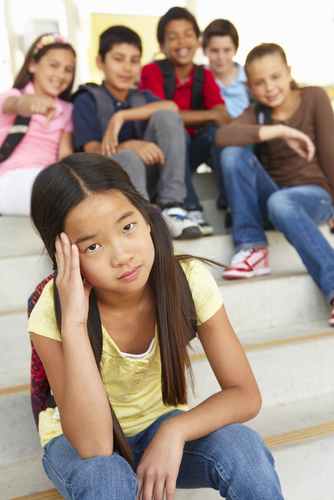
Photo: Shutterstock
At one time most people considered bullying to be a normal part of childhood with little need for adult intervention. However, considerable research has shown that bullying has long-term and deeply disturbing effects on the victims. Among psychologists and educators, school bullying is considered a problem that requires serious attention. Since often bullying takes place at school, schools have an obligation to prevent bullying and teach children how to deal successfully with bullying.
The problem of bullying is no less prevalent in Indian schools than elsewhere. One report said that 31.4% of the children surveyed in a study of 8 to 12 year olds in rural schools were being bullied both verbally and physically.
Bullying in schools might occur due to some differences in the victim that the bully might consider attractive to use, such as shyness, being clever or on the other hand scoring low grades, being the “wrong” color, sex or religion. Another survey that was done by the Indian Journal of Pediatrics in 2011 showed that 60.4% of the students were being bullied.
Experts believe that to combat bullying requires a “whole school” approach. Such an approach tackles bullying in multiple ways and involves administrators, teachers, students and parents. One such approach was developed by psychologist Dan Olweus, of Norway, in the 1980s. His program, now known as the Olweus Bullying Prevention Program, was formulated to help reduce and prevent bullying in students in elementary, middle and junior high schools. It has been quite successful in Norway, and has been tried in the US with mixed results. Subsequent research has shown that OBPP is also effective in high schools, with some program adaptation.
While there is no magic program that works completely, there are four principles of the Olweus Programme that are essential to its success:
1. Schools need to create an environment of caring and warmth, with engaged adults.
2. Children should understand that there will be zero tolerance of bullying and other such unacceptable behaviour.
3. Impartial and consistent consequences when rules are violated.
4. Adults must take a stand and act as role models.
These principles also need to be communicated to parents and they need to be encouraged to apply them at home. In many instances, bullies are themselves victims of rough treatment at home. In such cases, schools cannot directly intervene at home, but schools can encourage family counseling and offer parenting courses.
In order for the program to have a chance of succeeding, all students must participate in most aspects of the program, while students who are identified as bullies or as targets of bullying receive additional individualized interventions. Schools and parents must make children aware about bullying behaviors.
According to Olweus, bullies tend to have certain similar traits such as a strong desire to dominate other students and to have their own way. These children are short-tempered and impulsive and often display aggression and defiance towards adults. Bullies lack empathy towards victimized students and, if they are male, tend to be physically stronger than their peers.
In contrast, victims of bullying are usually sensitive, withdrawn and shy in nature. These children display traits of being anxious, insecure and unhappy. Victims usually face low self-esteem issues and could engage in suicidal ideation more often than their peers. They relate more to adults than to children of their own age. They are also likely to be physically weaker than their peers if they are male.
Efforts to build compassion and involve students in the process of change can make a paradigm shift in school culture to one where offending or hurting someone else, either in person or online, is not seen as cool. The whole culture can become a warm, caring environment where bullying is much less likely to occur.
Please like FamiLife’s page on Facebook so that you get all our articles and others may find us.
